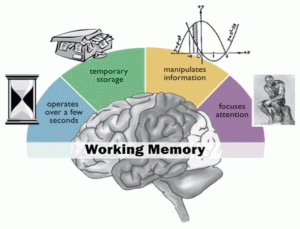How to Improve Memory – Simple Tools & Approaches
 Age Related Memory Decline is Not Inevitable
Age Related Memory Decline is Not Inevitable
There is now a large body of research that demonstrates how age-related memory loss is not as inevitable or irreversible as previously thought. In fact, this research shows, that our memories can actually be improved if we take simple steps and approaches consistently every day.
In exactly the same way we use physical exercise and a balanced diet to maintain the health of our physical bodies; it is also possible to maintain the health of our brain and our memory performance by paying attention to what we eat, how often we exercise and how we go about stimulating and challenging the brain to make it stronger.
The reality is that it is extremely easy to deploy a small number of effective memory boosting tools, approaches, techniques and exercises that will protect your brain and ultimately your memory for the long term.
There are a large number of memory improving exercises and approaches. Below I have outlined just five but I believe they are easiest techniques to deploy in order to immediately start improving and protecting your memory.
Improve Memory Tip #1 – The Importance of Repetition-Repetition
The use of repetition as a technique to improve memory performance, particularly for those individuals who are suffering from mild to moderate forms of dementia has been in practice for over three decades. Advances in our understanding of the brain show that continuity and repetition of tasks reinforces and strengthens neural pathways in the brain. However, it is important to note that in order to improve memory for the long term new neural pathways need to be created in the brain. So, while repeating a sentence or paragraph will help you remember it, finding new things to memorise on an ongoing basis is key. Repetition when used with visualisation exercises (see below) can be an extremely powerful combination when it comes to improving your brain fitness and your ability to memorise.
Improve Memory Tip #2 – Use Visualisation Exercises
Just as repetition has been shown to deliver significant benefits in improving memory and actually preventing age-related memory decline, so too has the use of visualisation been shown to boost short-term memory recall.
By creating a mental image in your mind of the thing you are trying to remember, you “anchor” it visually in your memory. This is a very powerful and effective technique that has been used by memory masters and chess champions around the world for decades. Most people remember images more easily than verbal or written information.
There are a number of visualisation exercises and techniques to choose from but perhaps one of the most effective, particularly if you have a list of things to remember is to use a technique called the Roman room or Memory Palace. Imagine a room you know well, such as your living room or bedroom with a number of different features or objects in it. Associate each item on the list with a feature of the room – for example if you are trying to remember a shopping list with bananas, milk and bread on it, you could dangle the bananas from the lamp, have the milk spilling over the table and the bread being eaten by your dog – the more outrageous/silly the images are the easier they are to remember.
And if you find it hard to visualise at first, this does get better with practice.
Improve Memory Tip #3 – The Active & Mindful Brain
According to the Harvard Medical School, perhaps the best and most effective way to protect your memory is to keep your brain active. This kind of memory boosting activity goes beyond the usual advice of doing crosswords, learning a new language etc. There is no doubt that these activities are beneficial to the mind but keeping your brain active is more an on-going process that involves trying to be continuously mindful as you move through your day.
The brain by definition is a very complex organ, the more it is used and challenged the stronger it becomes. The key to keeping your brain active and challenged is to consistently try to alter routines and habits that have become second nature over time. Doing things differently will create new neural pathways in the brain. This can be as simple as holding your toothbrush in the other hand or taking a different route on your way to work. This is essential for brain health and for strong memory as you age.
Improve Memory Tip #4 – Motion Creates Emotion & Stimulates Memory
Research shows that individuals trying to improve their memory recall show positive results while being dynamic. The physical nature of say, moving and gesturing with your hands or moving around while you talk, has been shown to help assist the brain in recalling memories.
Aerobic activity no matter how small delivers an increase of oxygen to the brain. This oxygenation process literally makes the brain more effective when it comes to memory recall.
Improve Memory Tip #5 –Your Way to a Better Memory
In the same way your body needs the correct intake of nutrients to keep it healthy and at peak performance so too does your brain. The reality is that in our modern always-on world, we often don’t get the chance to eat the right type of foods, in the right quantities at the right time. Vital memory protecting amino acids like L-methionine or L-theanine, commonly found in fresh fruit and nuts and vegetables and green tea are missing from many of our diets. There is a growing interest in the use of natural memory supplements containing essential memory supporting amino acids to top up what is missing from our inadequate diet. A significant amount of anecdotal evidence shows that the use of natural supplements to improve memory can be very effective when used in conjunction with the above for other memory improving tips.
Stay posted! Over the coming weeks ahead I intend to expand in further detail on each of the above memory improving tips and provide you with practical tools and exercises that you can take to really boost your memory for the future.
About the Author
Sam Jansen is a leading brain scientist, lawyer and author, studying neuroscience, social behaviors and the science of happiness.You can find him at Google+


















I have been working on ways to improve my memory for a number of years now .I found this piece very valuable in my continuous search for better memory.Salut
Hi my name is umar khatab.mh memory is very weak.i want you give me advise hiw can i makd my memory strong
I want my memory strong
You see all these ways to improve the mind. Do you know any ways to improve motivation?